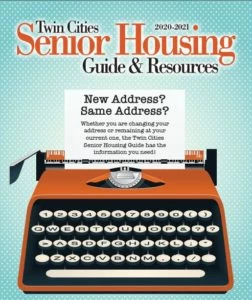What to Consider when Evaluating an Independent Senior Living Market Rate Rental


The Twin Cities Senior Housing Guide, available at www.seniorhousingguide.us, can streamline your research on senior housing types, prices, services, amenities, and availability. Updated annually, the information-grid format optimizes your ability to make an apples-to-apples comparison of “like” and “dissimilar” properties.
A Definition
An independent senior living market-rate rental property is typically categorized as age 55+ or 62+ apartment living with a range of amenities and hospitality services included in the monthly rent. Both deliver a mature adult setting where the desired demographic, culture, lifestyle, cost-economy, and “aging in place” priorities can be explored.
Amenities & Services
Compare and contrast the selection of conveniences, community activities, and wellness offerings included in the monthly rent. Common areas to socialize, play games, exercise, and read are often found within these communities, but other amenities and services vary greatly.
Identify your priorities based on your lifestyle and wellness goals by asking the following questions:
- Do I prefer a quiet urban setting or a bustling city scene?
- What building features and apartment characteristics are important?
- Do I want meals prepared or available?
- What hobbies and interests will I enjoy or pioneer?
- Do I want housekeeping?
- What transportation options are available for excursions, shopping, and medical appointments if I’m not driving?
- How safe and secure is the environment?
- Are“Aging in Place” and home health care programs available?
Culture and Personality
A community’s culture and personality are to be “felt” when you walk in the door. The best environments are those where, deliberately, or accidentally, leadership is deeply indebted to their team, staff, residents, and families. They are smart, intuitive, business-minded people with caring hearts. They create an excellent culture because it’s simply how they view life.
Questions to help you ascertain more about a community’s culture and how it is sustained include:
- Who is the leadership team? How seasoned are they?
- How does leadership communicate its value proposition?
- What is their employee retention rate?
- How are resident and employee satisfaction assessed and priorities managed?
- Is there an active Resident Council? How are priorities carried out?
- How does leadership communicate with residents and families?
Rent vs. Purchase
Rental communities are the most popular option in the United States and are usually the least expensive. These communities require residents to sign a lease and pay some type of security deposit or community fee. Some market-rate rental properties accept forms of financial subsidy. The lease term can vary from annual to month-to-month with the opportunity to vacate with written notice. There is no long-term commitment. Once a lease term is complete, no additional fees are required.
An equity or ownership-style senior community is where a resident purchases a unit and has full ownership privileges. As in a traditional real estate deal, pricing is usually negotiated with the previous owner. This type of community is most attractive to seniors who want to own something and hope to enjoy some level of equity appreciation upon resale.
Fees
Residents who rent will have no monthly maintenance fees, association dues, real estate taxes or assessments incurred. Garages would add an additional monthly fee as would a “second resident fee” for complimentary services delivered to another individual in the household to cover costs related to meals, transportation, breakfasts, beverage bars, and fitness equipment use. Renter’s insurance is a requirement and utilities may or may not be covered. Renovations to individual units can be negotiated depending upon the flexibility of property owners.
Residents who own typically pay a monthly maintenance fee, as well as association dues and, are responsible for covering real estate taxes and assessments as well. Renovations to individual units are typically paid for by the owner, however, this could be negotiated in the purchase price. Upon a resident’s departure or death, monthly fees must still be paid until the property is resold, which can pose financial challenges for sellers and surviving family members of the senior’s estate.
Independent vs. Continuum of Care Communities
Independent senior living properties do not, as a standard, provide health care or assistance with activities of daily living (ADLs), memory care or skilled nursing, however, residents are permitted to use third-party home providers to meet those needs.
Continuing Care Communities (aka Life Plan communities) offer an increasing intensity of healthcare from independent living through to skilled nursing within one single residence.
Summary
The demand for Market Rate Rentals is on the rise due to an increase in the senior population and their desire for a simpler, more care-free, and enriched lifestyle. If a perfect apartment awaits, typically a refundable security deposit will secure an apartment of choice or a fixed position on a waitlist.
A Resident Perspective
 Kay Gavin has been a RosePointe Senior Living resident since 2015. The following paragraphs share her perspective on selecting a market-rate rental and the value she places on culture, amenities, and services delivered.
Kay Gavin has been a RosePointe Senior Living resident since 2015. The following paragraphs share her perspective on selecting a market-rate rental and the value she places on culture, amenities, and services delivered.
“Before moving here, I looked at several rental and co-op (buy-in) facilities. I decided I didn’t want to buy a home again – either condo, townhome, or co-op – as I didn’t want my family to have the responsibility of selling a unit, especially since they lived out of town.
There are so many amenities here at RosePointe that are not offered elsewhere: van service for grocery shopping, medical appointments, and excursions; once a week housekeeping; 24-hour concierge service; 10 meals per month in our congregate dining room; outside entertainers providing musical programs; educational programs; themed get-togethers; fitness classes; and so much more.
I recently had hip replacement surgery…while I was waiting to have my surgery, numerous residents and staff inquired about my well-being, as they saw I was having pain with walking. They sent me off to surgery with prayers, good wishes, and hopes for a speedy recovery. After surgery, many residents offered to help – “just give me a call” – was echoed by several. I spent 2 nights in the hospital and, even though I was “alone” in my apartment when I came home, I never felt “alone”. I knew I could pick up the phone at any time and have someone visit or help with small chores if I needed it.
I can truly say I love living at RosePointe and feel blessed to be surrounded by such friendly and caring residents and staff.
